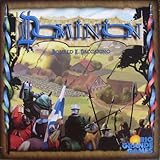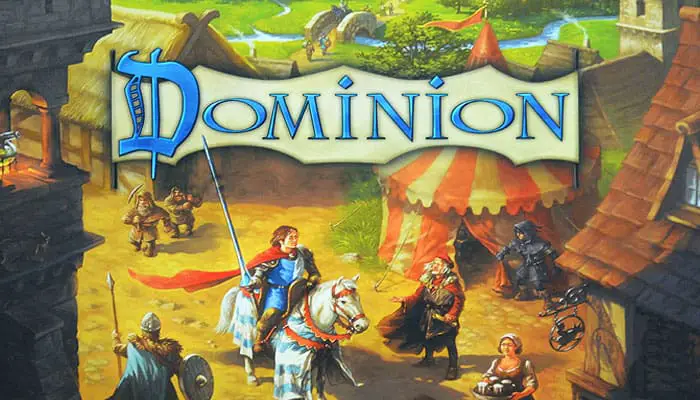
Dominion is one of those genre-defining games. It was released in 2008 to rave reviews and introduced a mechanic that has appealed to both hard-core gamers and non-game-geek muggles alike.
It took the deck building aspect of CCGs that was usually done before you ever sat down with an opponent to play a game and made that the central mechanic of in-game play. In a CCG, you look through your collection of cards and select a number of them to build a deck with.
You then shuffle that deck up and face off against an opponent who has built his own deck. In Dominion, 2-4 players sit around a common pool of cards and pick from them to construct their decks on the fly. The next expansion featured rules to allow for a 5th and 6th player to be added, but it is my opinion that the game's sweet spot is still 2-4 players.
There are 3 types of Basic Supply cards that will be available every game: Treasure, Victory and Curse cards.


The cost you need to pay in Coins to gain a card and add it to your deck is represented on the bottom left corner. For example, to add a Gold card to your deck, you would need 6 Coins available to purchase it.
When played from your hand a Treasure card will add Coins with which you can purchase cards. When played from your hand a Gold card will add 3 Coins to your purchasing power, where a Copper will only add 1 Coin.
Victory Cards
Victory cards will be added to your deck when purchased, but will have no value until the game ends and all players add up the total number of Victory Points printed on their Victory cards. The player with the most Victory Points at the end of the game is the winner. This introduces an interesting dilemma.
If you purchase Victory cards early in the game, you will be drawing useless cards that do nothing to help you acquire more cards or or build an efficient card-drawing or coin-producing engine.
If you wait too long to purchase Victory cards, you may find that the game ends before you had the chance to accumulate the Victory Points you needed to win the game.
Curse Cards
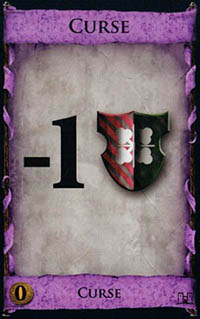
The Curse cards are available for purchase, but usually you'd never intentionally put them into your deck because at the end of the game they count as negative Victory Points. During the game they are dead cards similar to Victory cards that will clog up your deck with useless draws.
They are mainly there as support for special Attack cards that will add Curses to your opponents' decks.
In addition to these Basic Supply cards, you will add 10 randomly picked piles of Kingdom Cards. These are the fun cards that let you do cool stuff and develop different strategies and combos while playing the game. Because the basic game comes with 25 different Kingdom Cards, your pool of 10 cards in a game will always be different adding to the re-playability of Dominion.
With the first set alone there are 3,268,760 combinations of 10 cards you can play with; with all of the expansions included, that number goes up quite significantly. A smart guy once said, "variety is the lubricant for re-playability". Here's a few very basic Action Kingdom cards:

(Some Kingdom cards can be special Treasure or Victory cards)
To summarize: your supply of cards will have 3 Treasure piles (Gold, Silver and Copper), 3 Victory piles (Estates, Duchys and Provinces), 1 pile of Curses and 10 piles of Kingdom cards. Each pile of Kingdom Cards will have 10 copies of the same card so everyone has an equal chance to acquire some.
The number of Curse and Victory cards in each of their piles are adjusted and scaled according to the number of players (Victory Kingdom cards will also be scaled the same as Basic Victories).
For Treasure cards, ideally there should be enough of each that the piles should not run out in a game, but it can sometimes happen. This brings me to the two end game conditions; the game will end when any three of the supply piles run out of cards or the pile of Provinces runs out of cards.
Now that you can visualize the board set up, you're probably wondering, "How do I play the game?" Never fear, I have read your thoughts and will explain here.
Each player starts with a deck of 10 cards, compiled of 3 Estates and 7 Coppers. You shuffle up your deck and draw 5 cards. During your turn you'll need to know your ABCs:
Action
You start your turn with the ability to play 1 Action card.
Buy
Next, you will get the opportunity to Buy any 1 card from the supply piles. You can play any number of Treasure cards in your Buy step to add Coins to your pool.
Any Coins added by Action Cards earlier in your turn are also added to your purchasing power. Any card gained on your turn or bought during your Buy step will be immediately added to the top of your discard pile.
Clean Up
Discard all the cards you've played this turn and any cards left in your hand into your discard pile. Draw 5 new cards from your deck. If there are not enough cards to draw 5, draw as many as you can, shuffle your discard pile creating your new deck and draw the remaining needed cards needed from it. (You do this any time necessary when drawing cards. Never shuffle your discard until you are required to draw cards and your deck is empty).
It's as simple as that, you get 1 Action and 1 Buy per turn. You'll find that in drawing five new cards a turn, you'll cycle through your deck quite quickly meaning you will soon draw and play the cards you've purchased.
Take a look back at the above Action cards and I'll explain a little of the Dominion short hand. You always do what the Action card says, in the order it's written. Market best shows all the basics:
+1 Card: this means draw 1 card immediately. Some Action cards will have +2 Cards, + 3 Cards, etc.
+1 Action: this grants you the ability to play another Action card this turn. Note that Village grants you +2 Actions, allowing you to play 2 more Actions this turn. Any unused Actions in a turn are lost. Actions are cumulative, so if you play two Villages in a row, you will have 3 Actions remaining.
+1 Buy: this allows you to purchase an additional card during your Buy step. This number can also be +2, +3, etc., and is also cumulative.
+Coin: This will grant you 1 Coin to be used in your Buy step. Sometimes there will be a number inside the Coin icon telling you how many coins are added. For example Militia will add 2 Coins for your buy step.
Speaking of Militias, lets look at a couple different Action types, Attacks and Reactions:

Attack Cards
Attack cards will have an effect that will mess with your opponents' hand or deck. Basically, they will ruin their day paving the way to your own victory with their salty tears. But never fear, you may have access to cards that will grant you defenses against their own attacks.
Reaction Cards
Reaction cards have a secondary reaction effect you can play in response to an Attack card affecting you. When you play Moat during your turn as a regular Action it will grant you +2 cards, so it's never a dead card (the regular Action is above the Line).
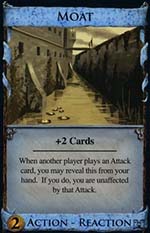
When someone plays an Attack card against you and you have Moat in hand, you can play its Reaction effect (the Reaction effect is below the line). In Moat's case, it will negate any effect of an Attack and remain in your hand to counter any more Attacks and you can still play it for its regular Action when your turn comes back around.
As an avid CCG player I've found that Dominion scratches an itch in a most pleasing way in that it plays like your favorite combo decks in from the past. When you can chain together additional Actions and card drawing to play your whole deck in a turn, it's a satisfying feeling even if you lose (hopefully you're pulling off multiple Victory purchases in that turn, though).
In addition to Dominion's basic Action cards, there are cards that will hold deeper strategies.
Ah, this is a good question, young Padawan, but search your true feelings for the answer. Is Silver not better than Copper? Is Gold not better than Silver? At the start of the game your deck is clogged with crappy Copper cards.
The most Coins you can produce with your starting deck in a 5 card hand is 5 Coins. You can add more Gold cards to your deck, but the Copper is still there decreasing your odds of drawing that Gold early and often. Chapel fixes that for you.
Trash that cheap metal, yo, and while your at it get rid of those whack Estates A.S.A.P.. They aren't doing anything for you early game but giving you dead draws, and if you build a decent engine you'll be acquiring much more bang for your card buck in Gold and Provinces later on.

(Whenever you gain a card, it goes to the top of your discard pile, just as if it were bought)

You want combos? We got combos! My all time favorite winning combo ended the game quickly with just 5 cards left in my deck. The card pool had Chapel, Throne Room and Remodel. My first two turns I purchased a Remodel and Chapel.
On subsequent turns, I removed all the Copper from my deck with Chapel. A couple Estates were remodeled into a Throne Room and a 2nd Remodel. I continued to use Chapel to thin my deck down to 5 cards and used Throne Room to turbo up the Remodels into gaining two Provinces a turn (multiple Remodels were gained and eventually Remodeled into Provinces themselves).
Once I reached the Five card build of Throne Room, Remodel, Province, Province, Province I drew the exact 5 same cards every turn allowing me to Throne Room my lone Remodel every time. I started milling out the Province pile by Remodeling my Provinces into more Provinces.
This ended the game quicker than my opponent's could keep up with and 18 Victory Points was all I needed to win the game.

Probably my second favorite Combo of all time, and it's directly the opposite of the Turbo Remodel and goes completely against my statement before about thinning your deck of crappy useless Copper and Estates. First two turns consist of buying two Workshops.
From here on out you are on autopilot: If you play a Workshop, gain more Workshops or Gardens with it and use your Buy to get more Gardens and Workshops. If you can't afford a Workshop or Gardens, buy an Estate.

If you can't afford an Estate buy a Copper for free. That's it; if your opponents don't catch on and start stealing Gardens from the supply you'll be amassing a huge deck at two cards gained per turn making your Gardens worth a lot of Victory Points. You'll end the game by depleting the Workshop, Gardens and Estates piles. I've had 50-60 card decks by the time the smoke cleared.
The beauty of Dominion is that I can get anyone to play it. My girlfriend hates Magic, doesn't want anything to do with it and I made the mistake of describing Dominion to her as a take on the deck building aspect of Magic.
She flat out said she'd never play it for that reason. Eventually, I convinced her to give it a try and she was hooked. In fact, everyone I've introduced to the game has enjoyed it, whether they are old school CCG players or non-gaming relatives who think Monopoly is the pinnacle of unplugged gaming.
Did I mention there are expansions? As it's the first Deck Building game on the market and hugely successful, there have been quite a few released. You don't need to own them all to enjoy Dominion; I have logged hundreds of games with just the first set and enjoyed every single one.
The expansions do introduce new concepts when you are ready and you can pick and choose which ones are the most appealing to you if you just want to expand your collection with a box or two.
Expansions of Dominion:
Dominion: Intrigue

As you can see, Intrigue introduced dual-type cards to the mix, cards that were both Victory and Action, Treasure and Victory, etc.. It also introduced more interactive cards both in the form of fun card swapping Actions and harsher Attacks.

My girlfriend vetoes some of the Attack cards from this set if they come up because she doesn't like the conflict, but my more hardcore friends look forward to them with the opportunity to screw each other over.
That's the beauty of Dominion, it has enough choices that there's something for everyone and you never have to play with cards you don't want to. Intrigue included another full set of Basic Supply cards so you could play 5-6 now, or run two separate 4 player games at the same time.
Dominion: Seaside

Seaside introduces a couple of non-card metal embargo and coin tokens to track the new effects of some cards. It also introduced Duration Cards; these cards when first played will not be discarded during your Clean Up step, instead they stay in play to grant you more effects for your next turn.

I enjoy the Duration cards very much, and there are a few new cards that let you do some crazy things. Pirate Ship may top the list as the most fun to play, but the most annoying to play against. From Seaside on, no more Basic Supply cards were included. You will need either Dominion or Dominion: Intrigue to play with this and the following expansions.
Dominion: Prosperity
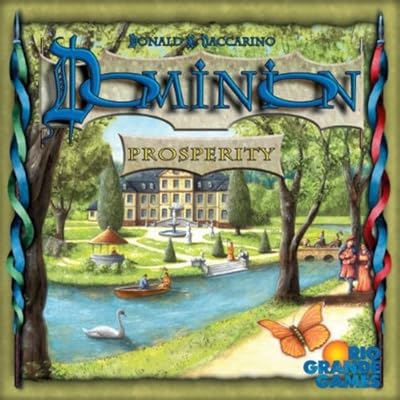
Prosperity is probably my favorite set. It introduces a go big or go home kind of theme, where everything is turned up to eleven. Two Basic Supply cards are added to the original 7 in the Basic Supply if you are playing with only Prosperity in your supply of 10 Kingdom cards.

If you play with a mix of cards from all sets I like to include the Colonies and Platinum if there are at least 2 or 3 Prosperity cards in the mix as they will have higher costs or one of the cards will specifically deal with Colonies or Platinum. Prosperity also includes little metal Victory Point tokens that can be gained through certain Actions. It also has more coin tokens.
Dominion: Alchemy

Alchemy is one of two smaller expansions for Dominion with only 12 new Kingdom Cards. A new type of Treasure was added to fit the theme called Potions.

Some of the Alchemy cards include a Potion in their cost in addition to Coins. If any cards in your 10 randomly chosen Kingdom cards include a Potion in the cost or Action, you need to include the pile of Potions as part of your Basic Supplies.
Because the cards in Alchemy have a special cost requirement, they give you much stronger effects than cards from other sets. It's interesting to figure out if an Alchemy card is worth the extra time it takes to buy a Potion and and play it later with enough coins to buy it.
Dominion: Cornucopia

Cornucopia's central theme is cards that reward you for building a deck with variety. Many cards will have you reveal from your hand or deck looking for differently named cards to give you a bigger effect like Menagerie above.

This set also introduced Prize cards. There is a set of 5 unique Prizes that are kept away from the Supply pile and you can not buy or gain them through any Action other than the Tournament card.
It's difficult, but if you win a Tournament you get to look through the Prize pile and pick one Prize card to add to your deck for a very powerful effect.
Dominion: Hinterlands
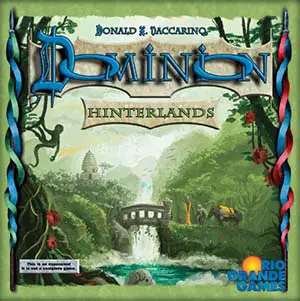
The basic theme will be cards that will have immediate effects when you buy them. A few cards have been spoiled from a German FAQ, but the details are still sketchy.
One that seems legit (it may be completely inaccurate; seems legit is not actually legit) is an Action card that costs 5 Coins. When you gain it, your opponents each gain a Silver card. When you play it, draw 5 cards and Discard 3.
So this card represents a downside cost when purchased to counter the level of power it gives you when played. I would imagine there are other Hinterlands cards that will probably give you positive effects when purchased as well.
When the designer first talked about Dominion, he hinted that he had 7 expansion sets already filed away. So far we've seen 4 complete expansions and 2 smaller sets. I believe the choice to do the smaller sets came after he hinted at this so it remains to be seen if we'll see 1, 2 or even more expansions.
I really appreciate David's attention to detail in game design. Even though his is the first entry in the Deck Building genre, he got a lot of things right from the very beginning. He made a very simple rules set that not only is very easy to teach, it allows for a lot of creative room in designing new cards. He understands the challenge of scaling a game from 2-4 players (or even 5-6) and made many of his design choices with that in mind.
For example, the very basic discard attacks will always only make a player discard down to a certain number. If you are in a 5 or 6 player game and everyone is playing Militias, you will only have to discard down to 3 cards no matter how many are played allowing to you at least play something on your turn and not be completely dead in the water.
Other Deck Building game designers sometimes missed little details like this in their rush to get their own Deck Building game on the market while the genre is hot. I especially love the common pool of Kingdom cards. Each player has access to the same options from the very beginning; there is no luck of the draw favoring some players with access to more powerful cards or combinations.
Read also the article about getting better.
Continue Reading
